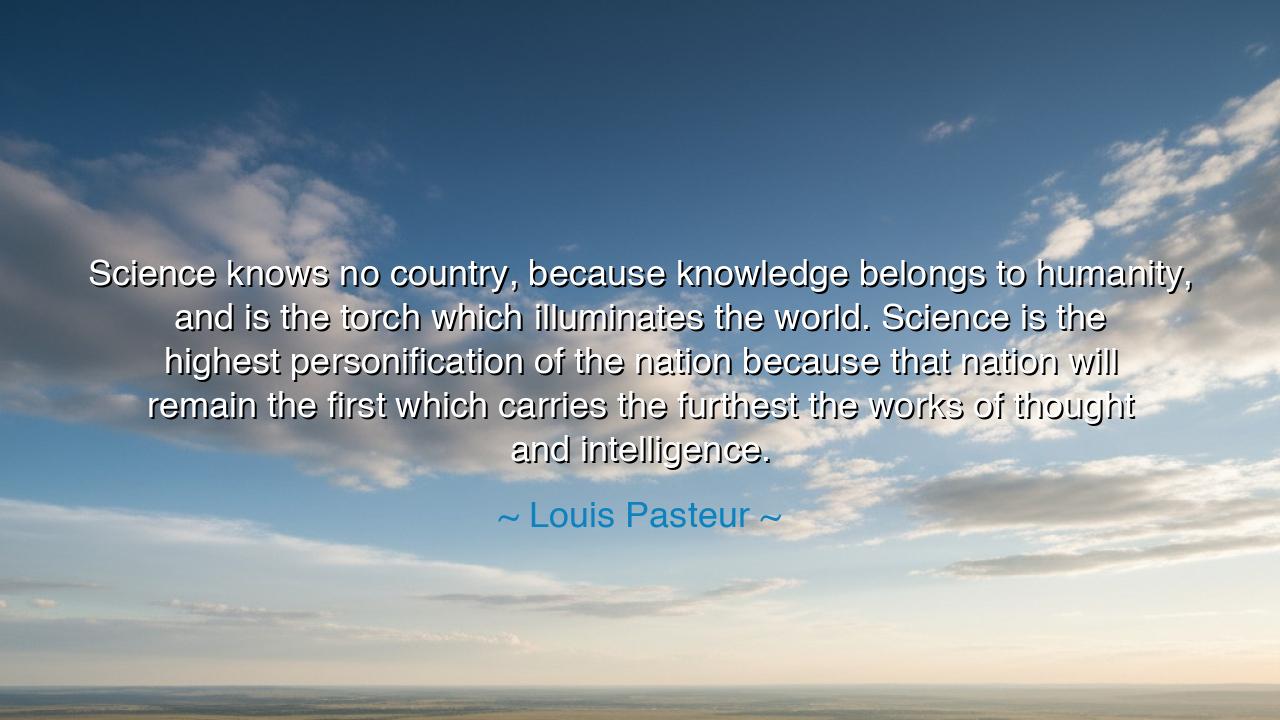
Science knows no country, because knowledge belongs to humanity
Science knows no country, because knowledge belongs to humanity, and is the torch which illuminates the world. Science is the highest personification of the nation because that nation will remain the first which carries the furthest the works of thought and intelligence.






The words of Louis Pasteur — “Science knows no country, because knowledge belongs to humanity, and is the torch which illuminates the world. Science is the highest personification of the nation because that nation will remain the first which carries the furthest the works of thought and intelligence.” — stand as both revelation and commandment. Spoken by one of the great saviors of humankind, these words remind us that science is not bound by borders, language, or flag. It belongs to the spirit of the world itself — a fire that burns wherever minds seek truth. In Pasteur’s vision, knowledge is the sacred inheritance of all people, a divine flame meant not for conquest but for illumination.
In these lines, Pasteur proclaims that science knows no country, because truth cannot be contained within the fences of politics or pride. Gravity does not bow to kings, nor does disease respect frontiers. The same stars that shine over Paris shine over Beijing and Buenos Aires. To Pasteur, knowledge was the language of creation itself — universal, eternal, free. The discoveries of one nation uplift all, and every advancement of the mind becomes a victory for the human race. Those who hoard knowledge for power betray the very spirit of science, for it was never meant to serve domination, but enlightenment.
The origin of this quote lies in the 19th century, during a time when the world was awakening to industrial and scientific revolution. Nations competed for progress, often claiming invention as a banner of superiority. Pasteur, a Frenchman devoted to the study of microbiology, lived through wars and rivalries — yet he saw beyond them. His breakthroughs in germ theory, pasteurization, and vaccination saved millions of lives, not just in France but across continents. He believed that science transcended nationalism, and that the measure of a great nation was not its armies, but the depth of its thought. True glory, he said, belonged to the country that carried forward the torch of intelligence, lighting paths for others to follow.
Pasteur’s own life embodied this creed. When his discoveries in microbiology challenged long-held beliefs, he faced ridicule and resistance. Yet he persevered, guided not by pride of country but by love of truth and duty to mankind. When he developed the rabies vaccine, his work reached beyond France to save children in distant lands. One story tells of a young boy bitten by a rabid dog — Joseph Meister — who was brought to Pasteur as a last hope. Pasteur, risking his reputation and the unknown, performed the first human vaccination. The boy lived. From that moment on, science became a moral act, and Pasteur’s words found life: knowledge belongs to humanity, not to one man, one people, or one empire.
The torch of science, as Pasteur calls it, is the flame that drives civilization forward. It is the light that turns ignorance into understanding and despair into healing. Yet that torch burns only when tended with humility and unity. History shows that when nations isolate their knowledge in jealousy or fear, progress withers. During the Second World War, even amid conflict, scientists from different lands sought to share findings that could heal rather than harm — reminders that the laws of nature unite us even when politics divide us. For every war, there have also been moments of collaboration — the eradication of smallpox, the exploration of space, the mapping of the human genome — when humanity rose above borders and carried Pasteur’s vision into the future.
But Pasteur’s message carries another layer of wisdom. When he says that science is the highest personification of the nation, he does not deny patriotism — he redefines it. The truest service to one’s country, he tells us, is not conquest, but contribution; not power, but progress. A nation’s greatness is not in the might of its armies, but in the strength of its ideas. The highest patriotism is to expand the boundaries of human knowledge, for in doing so, we expand the destiny of all people. A country that nurtures the mind becomes immortal through the works of thought it leaves behind.
So, O seeker of truth, take this wisdom into your heart. Let science be your allegiance and knowledge your faith. Do not measure your love of country by the walls you defend, but by the light you share. Study deeply, think freely, and give generously of your discoveries. Whether you are a scientist, an artist, or a dreamer, remember that your intelligence is a spark of that same torch Pasteur spoke of. Tend it well, and use it not for division, but for illumination. For the truest victory — the one that outlasts all wars and empires — is to carry the flame of knowledge further than those before you, and to leave the world brighter than you found it.






AAdministratorAdministrator
Welcome, honored guests. Please leave a comment, we will respond soon